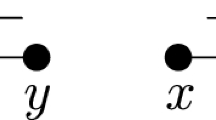Abstract
This work is a contribution to realizing prioritized reasoning in logic programming in the presence of preference relations involving atoms. In more details, the case of dynamic preferences is investigated and a semantics interpreting each preference rule as a tool for representing a choice over alternative options is proposed. The technique, providing a new interpretation for prioritized logic programs, is inspired by the one proposed by Sakama and Inoue in [19] and enriched with the use of structural information of preference rules as proposed by Brewka et al. in [6]. Specifically, the analysis of the logic program is carried out together with the analysis of preferences in order to determine the choice order and the sets of comparable models. The proposed approach is compared with those in [6, 19]. Complexity analysis is also performed showing that the use of additional information does not increase the complexity of computing preferred stable models.
Preview
Unable to display preview. Download preview PDF.
Similar content being viewed by others
References
Boutilier, C., Brafman, R., Domshlak, C., Hoos, H., Poole, D.: CP-nets: A tool for representing and reasoning with conditional ceteris paribus preference statements. JAIR 21, 135–191 (2004)
Brewka, G.: Well-Founded Semantics for Extended Logic Programs with Dynamic Preferences. JAIR 4, 19–36 (1996)
Brewka, G., Eiter, T.: Preferred Answer Sets for Extended Logic Programs. Artificial Intelligence 109(1-2), 297–356 (1999)
Brewka, G., Eiter, T.: Prioritizing Default Logic. Intellectics and Computational Logic, 27–45 (2000)
Brewka, G.: Logic programming with ordered disjunction. AAAI/IAAI, pp. 100–105 (2002)
Brewka, G., Niemela, I., Truszczynski, M.: Answer Set Optimization. In: IJCAI, pp. 867–872 (2003)
Brewka, G.: Complex Preferences for Answer Set Optimization. In: KR, pp. 213–223 (2004)
Brewka, G., Niemela, I., Truszczynski, M.: Prioritized Component Systems. In: AAAI, pp. 596–601 (2005)
Buccafurri, F., Faber, W., Leone, N.: Disjunctive deductive databases with inheritance. In: ICLP, pp. 79–93 (1999)
Delgrande, J.P., Schaub, T., Tompits, H.: Logic Programs with Compiled Preferences. In: ECAI, pp. 464–468 (2000)
Delgrande, J.P., Schaub, T., Tompits, H.: A compilation of brewka and eiter’s approach to prioritization. In: Brewka, G., Moniz Pereira, L., Ojeda-Aciego, M., de Guzmán, I.P. (eds.) JELIA 2000. LNCS, vol. 1919, pp. 376–390. Springer, Heidelberg (2000)
Delgrande, J.P., Schaub, T., Tompits, H.: A Framework for Compiling Preferences in Logic Programs. Theory and Practice of Logic Programming 3(2), 129–187 (2003)
Eiter, T., Gottlob, G., Mannila, H.: Disjunctive Datalog. ACM Transaction On Database Systems 22(3), 364–418 (1997)
Gelfond, M., Lifschitz, V.: The Stable Model Semantics for Logic Programming. In: ICLP, pp. 1070–1080 (1988)
Gelfond, M., Lifschitz, V.: Classical Negation in Logic Programs and Disjunctive Databases. New Generation Computing 9, 365–385 (1991)
Gelfond, M., Son, T.C.: Reasoning with prioritized defaults. In: Dix, J., Moniz Pereira, L., Przymusinski, T.C. (eds.) LPKR 1997. LNCS, vol. 1471, pp. 164–223. Springer, Heidelberg (1998)
Elkabani, I., Pontelli, E., Son, T.C.: A system for computing answer sets of logic programs with aggregates. In: Baral, C., Greco, G., Leone, N., Terracina, G. (eds.) LPNMR 2005. LNCS, vol. 3662, pp. 394–398. Springer, Heidelberg (2005)
Papadimitriou, C.H.: Computational Complexity. Addison-Wesley, Reading (1994)
Sakama, C., Inoue, K.: Priorized logic programming and its application to commonsense reasoning. Artificial Intelligence 123, 185–222 (2000)
Schaub, T., Wang, K.: A Comparative Study of Logic Programs with Preference. In: IJCAI, pp. 597–602 (2001)
Van Nieuwenborgh, D., Vermeir, D.: Preferred answer sets for ordered logic programs. In: Flesca, S., Greco, S., Leone, N., Ianni, G. (eds.) JELIA 2002. LNCS, vol. 2424, pp. 432–443. Springer, Heidelberg (2002)
Van Nieuwenborgh, D., Vermeir, D.: Ordered Diagnosis. In: Y. Vardi, M., Voronkov, A. (eds.) LPAR 2003. LNCS, vol. 2850, pp. 244–258. Springer, Heidelberg (2003)
Van Nieuwenborgh, D., Heymans, S., Vermeir, D.: On programs with linearly ordered multiple preferences. In: Demoen, B., Lifschitz, V. (eds.) ICLP 2004. LNCS, vol. 3132, pp. 180–194. Springer, Heidelberg (2004)
Wakaki, T., Inoue, K., Sakama, C., Nitta, K.: Computing Preferred Answer Sets in Answer Set Programming. In: Y. Vardi, M., Voronkov, A. (eds.) LPAR 2003. LNCS, vol. 2850, pp. 259–273. Springer, Heidelberg (2003)
Wakaki, T., Inoue, K., Sakama, C., Nitta, K.: The PLP system. In: Alferes, J.J., Leite, J. (eds.) JELIA 2004. LNCS, vol. 3229, pp. 706–709. Springer, Heidelberg (2004)
Wang, X., You, J.H., Yuan, L.Y.: Nonmonotonic reasoning by monotonic inferences with priority conditions. In: Dix, J., Przymusinski, T.C., Moniz Pereira, L. (eds.) NMELP 1996. LNCS, vol. 1216, pp. 91–109. Springer, Heidelberg (1997)
Wang, K., Zhou, L., Lin, F.: Alternating Fixpoint Theory for Logic Programs with Priority. Computational Logic, 164–178 (2000)
Zhang, Y., Foo, N.: Answer sets for prioritized logic programs. In: ILPS, pp. 69–83 (1997)
Author information
Authors and Affiliations
Editor information
Editors and Affiliations
Rights and permissions
Copyright information
© 2006 Springer-Verlag Berlin Heidelberg
About this paper
Cite this paper
Greco, S., Trubitsyna, I., Zumpano, E. (2006). On the Semantics of Logic Programs with Preferences. In: Fisher, M., van der Hoek, W., Konev, B., Lisitsa, A. (eds) Logics in Artificial Intelligence. JELIA 2006. Lecture Notes in Computer Science(), vol 4160. Springer, Berlin, Heidelberg. https://doi.org/10.1007/11853886_18
Download citation
DOI: https://doi.org/10.1007/11853886_18
Publisher Name: Springer, Berlin, Heidelberg
Print ISBN: 978-3-540-39625-3
Online ISBN: 978-3-540-39627-7
eBook Packages: Computer ScienceComputer Science (R0)




